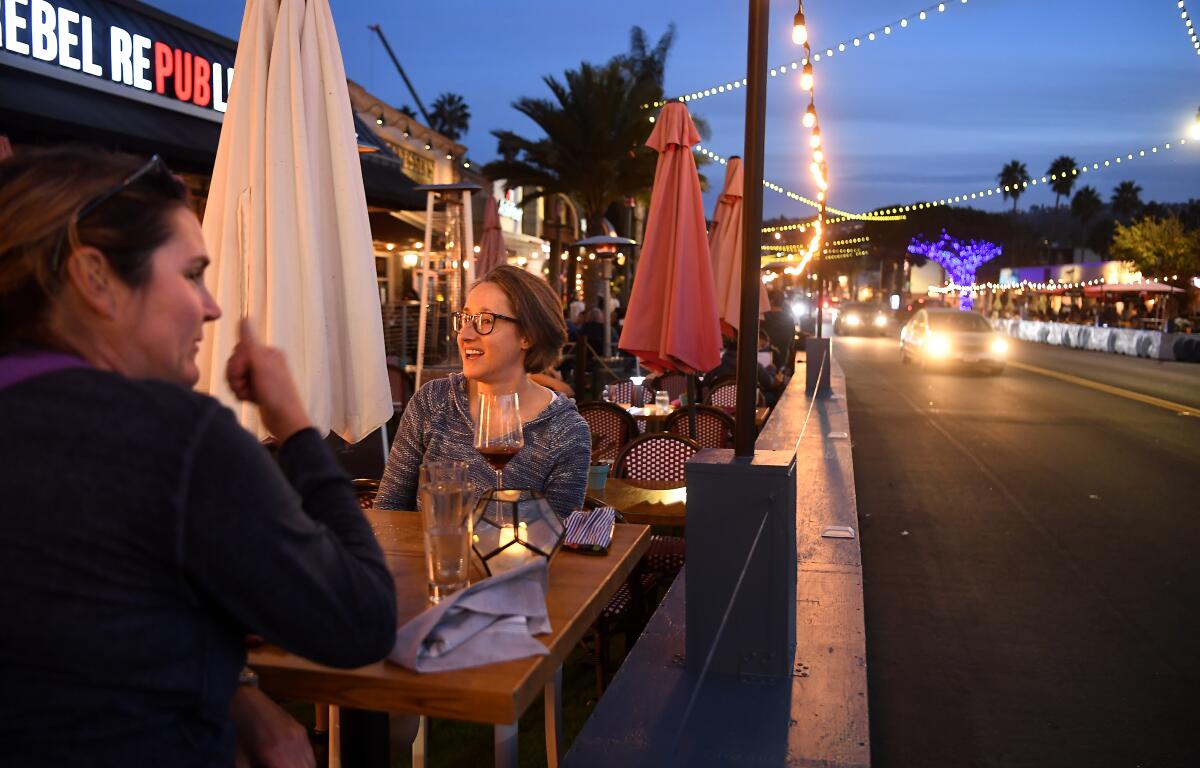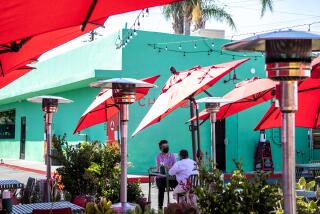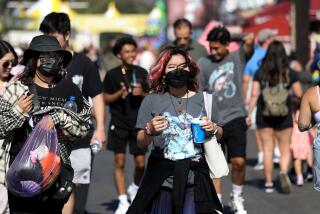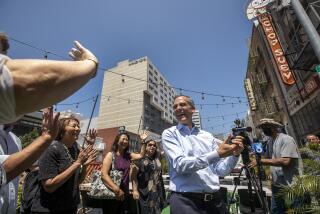Critics say L.A. County’s suspension of outdoor dining will ‘further devastate’ economy

The decision to temporarily suspend outdoor dining for restaurants in Los Angeles County in hopes of slowing an unprecedented surge in coronavirus cases has sparked a backlash from eateries and some county officials, who worry about the devastating economic toll.
The decision comes as Los Angeles County recorded its highest one-day total for coronavirus cases on Monday, and officials said conditions are deteriorating so much that some type of new stay-at-home order might soon be necessary.
Health officials argued the outdoor dining restrictions are warranted given the critical healthcare crisis. They noted that restricting businesses has worked to bring down coronavirus cases in the past, and that action is needed before hospitals are overwhelmed.
Gov. Gavin Newsom has announced a stay-at-home order affecting most of California.
The virus is spreading like never before in the county, and officials fear the Thanksgiving holiday will make matters worse.
However, Supervisor Kathryn Barger said Monday that “these proposed measures by the Department of Public Health will further devastate local businesses and employees who have been asked to shoulder an unfair burden this year.”
County businesses “have invested thousands of dollars to ensure safety for their employees and customers only to be punished for the recent surge they have done everything in their power to prevent,” she said in a statement.
“Increased case counts are not coming from businesses reopening, but from large gatherings where people aren’t wearing masks,” she said. “We aren’t helpless in slowing the spread of COVID-19 and can protect ourselves and our neighbors by maintaining physical distancing and wearing face coverings.”
The new rule takes effect at 10 p.m. Wednesday and restricts restaurants — along with breweries, wineries and bars — to takeout and delivery only for the first time since May. It will remain in place for at least three weeks, officials said. Wineries and breweries can continue retail operations.
Many restaurants have expressed concerns about whether they can survive the restrictions.
“It’s an impossible game that doesn’t make any sense, and it seems like nobody cares about us,” said Casa Vega owner Christy Vega Fowler. “They told us we could operate with outdoor dining, we did it safely, we made the investment, and then they take it away from us. It’s devastating.”
The Independent Hospitality Coalition issued a statement Monday questioning why restaurants were being targeted when the county has offered no evidence that they were a major spreader of COVID-19.
“Many of our members were able to open and operate safely while cases and hospitalizations were dropping,” the organization said. “Only after more private events started occurring, such as Halloween parties, did cases start to spike. By banning all outdoor dining during these colder winter months, people will instead host more indoor parties, which will undoubtedly lead to more infections. Furthermore, curfews and outdoor dining restrictions have only exacerbated the problem and pushed more social gatherings indoors.”
But other county officials backed the restrictions.
The new rules, though economically painful, “are necessary to address our rapid acceleration of cases and increase in hospitalizations,” L.A. County Supervisor Hilda Solis said.
“Our healthcare workers are exhausted, our essential workers are severely impacted and, while our residents are as well, this is a critical juncture requiring decisive action and a steadfast commitment to safety because lives are at stake,” she said in a statement Monday morning. “With yesterday’s actions, I know our residents will once again slow the spread of COVID-19 and its destructive economic consequences.”
The average number of new daily coronavirus cases over a five-day period reached 4,097 on Sunday, county health officials said — uncomfortably close to the 4,500 that would trigger a new three-week order permitting only essential workers and those procuring essential services to leave their homes.
Between Nov. 7 and Nov. 20, there has been a 61% increase in hospitalization, a pace of increase that “could potentially lead to overwhelming the healthcare system,” L.A. County Public Health Director Barbara Ferrer said.
In Long Beach, city and health officials are seeing a 248% increase in hospitalizations since November 1.
“That is a very disturbing increase — especially the speed at which it is growing,” Mayor Robert Garcia said in a teleconference Monday.
He said the current hospitalization rate is around 60%.
Garcia said Long Beach Memorial Medical Center and St. Mary’s Medical Center both have reported seeing hospitalizations double in recent days.
“In some cases, they’re seeing more young people, pregnant women and children being hospitalized with COVID-19,” he said.
He said there is space available at hospitals, but that could soon change if the current rate of infections and hospitalizations continues.
When the last surge occurred, Garcia said the city was conducting, at its highest, 1,900 tests a day. This past Friday, they conducted 2,500 tests.
It was the highest number of tests completed in one day in Long Beach, he said.
More to Read
Sign up for Essential California
The most important California stories and recommendations in your inbox every morning.
You may occasionally receive promotional content from the Los Angeles Times.













